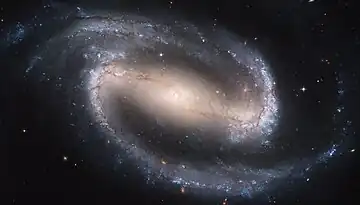| NGC 1300 | |
|---|---|
 A Hubble Space Telescope (HST) image of NGC 1300 | |
| Observation data (J2000 epoch) | |
| Constellation | Eridanus |
| Right ascension | 03h 19m 41.1s (49.9210)[1] |
| Declination | −19° 24′ 41″ (-19.4112)[1] |
| Redshift | 0.005260 (1577 ± 4 km/s)[1] |
| Distance | 61.3 Mly (18.8 Mpc)[2] |
| Apparent magnitude (V) | 11.4[1] |
| Characteristics | |
| Type | (R')SB(s)bc[1] |
| Size | 110,000 light years in diameter |
| Apparent size (V) | 6.2′ × 4.1′[1] |
| Notable features | Huge bar-shaped core and two spiral arms |
| Other designations | |
| MCG-03-09-018,[1] ESO 547 -G 31,[1] PGC 12412,[1] UGCA 066[1] | |
NGC 1300 is a barred spiral galaxy located about 61 million light-years away in the constellation Eridanus. The galaxy is about 110,000 light-years across. It is a member of the Eridanus Cluster, a cluster of 200 galaxies.[3][4] It was discovered by John Herschel in 1835.[5]
Nucleus
In the core of the larger spiral structure of NGC 1300, the nucleus shows a "grand-design" spiral structure that is about 3,300 light-years long. Only galaxies with large-scale bars appear to have these grand-design inner disks — a spiral within a spiral. Models suggest that the gas in a bar can be funneled inwards, and then spiral into the center through the grand-design disk, where it can potentially fuel a central supermassive black hole (SMBH). NGC 1300 is not known to have an active nucleus, indicating that its central black hole is not accreting matter. The SMBH has a mass of 7.3+6.9
−3.5×107 M☉.[6][7]
At least one supernova has been observed in NGC 1300: SN 2022acko (type IIP, mag. 15.8).[8][9]
See also
- NGC 1672, a similar spiral galaxy
- NGC 7479, a galaxy with a very similar structure and both size and morphology similar
- NGC 1232, a nearby intermediate spiral galaxy
References
- 1 2 3 4 5 6 7 8 9 10 "NASA/IPAC Extragalactic Database". Results for NGC 1300. Retrieved 2007-03-15.
- ↑ Atkinson, J.W.; et al. (2005). "Supermassive black hole mass measurements for NGC 1300 and NGC 2748 based on HST emission-line gas kinematics". Monthly Notices of the Royal Astronomical Society. 359 (2): 504–520. arXiv:astro-ph/0502573. Bibcode:2005MNRAS.359..504A. doi:10.1111/j.1365-2966.2005.08904.x. S2CID 16193663.
- ↑ "NGC 1300, a barred spiral galaxy in Eridanus". annesastronomynews.com. 2012-04-27. Retrieved 2013-08-18.
- ↑ "The Fornax and Eridanus Clusters". An Atlas of The Universe. Retrieved 2010-05-03.
- ↑ Seligman, Courtney. "Celestial Atlas: NGC Objects: NGC 1300 - 1349". cseligman.com. Archived from the original on 12 June 2015. Retrieved 25 July 2015.
- ↑ Graham, Alister W. (November 2008). "Populating the Galaxy Velocity Dispersion - Supermassive Black Hole Mass Diagram: A Catalogue of (Mbh, σ) Values". Publications of the Astronomical Society of Australia. 25 (4): 167–175. arXiv:0807.2549. Bibcode:2008PASA...25..167G. doi:10.1071/AS08013. S2CID 89905.
- ↑ Atkinson, J. W.; et al. (2005). "Supermassive black hole mass measurements for NGC 1300 and NGC 2748 based on HST emission-line gas kinematics". Monthly Notices of the Royal Astronomical Society. 359 (2): 504–520. arXiv:astro-ph/0502573. Bibcode:2005MNRAS.359..504A. doi:10.1111/j.1365-2966.2005.08904.x. S2CID 16193663.
- ↑ SN 2022acko Retrieved 29 December 2022.
- ↑ David Bishop. "Supernova 2022acko in NGC 1300". Retrieved 2023-02-17.